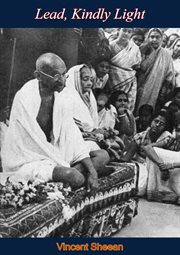Nonfiction
eBook
Details
PUBLISHED
Made available through hoopla
DESCRIPTION
1 online resource
ISBN/ISSN
LANGUAGE
NOTES
In this book, the author of Personal History, Vincent Sheean, demonstrates that Gandhi's life, work and teaching were for the whole world as well as for India. It is suggested that the terrifying weapon of non-violence, having freed India, might be about to free the world. Though this book is in one sense an attempt to reveal the meaning of Mahatma Gandhi's power and life and teaching, it is, in a more important sense, the author's eloquent testament of belief in Gandhi's mission. Vincent Sheean went to India to ask Gandhi many questions. It was a quest brought on by the failure of every other human institution to supply hope for the future. What he learned there, from Gandhi and others, is of immense, immediate importance to all men everywhere and to the future of humanity. Thoughtful men have begun to see that the only weapon even more awesome than the atom bomb, the only weapon able to contend with it on anything like equal terms, is the irresistible weapon of non-violence conceived by Mahatma Gandhi. Here is the record of its first great success, the story of how it was created, and a clear, sympathetic explanation of the philosophy that brought it into being, indeed made it inevitable. Here, also, are chapters on the background of Hindu philosophy, on Gandhi's own beliefs and how he applied them, on Gandhi's progress from an obscure lawyer in South Africa to his position as India's leader and deliverer and the greatest force for peace at the present time, on the author's own meetings with Gandhi, the assassination and funeral, both of which he witnessed, and a final chapter of the author's conclusions on Gandhi's meaning to the future of world peace in this atomic age. The title of the book comes from Gandhi's favourite hymn, which was always sung on solemn occasions, including the funeral march to the Ganges
Mode of access: World Wide Web







